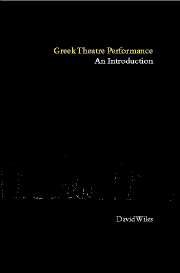4 - Gender
Published online by Cambridge University Press: 05 February 2015
Summary
WOMEN, POLITICS AND MYTH
The problem
Amongst our qualities,
god's gift of singing to the lyre
was not granted us by Apollo, commander of music.
Otherwise I'd have sung out my reply
to the race of men.
The past has as much to tell of woman's lot
as it does of males.
(chorus: Medea, 424–30)The theatre of Athens was created by and for men, yet it is generally thought to contain some of the best female roles in the repertory. The contrast with Shakespearean theatre is a striking one. Why? The question has caused much concern in the late twentieth century.
The first surviving words of dramatic dialogue from the Greek world are actually written by a woman:
— Virginity, virginity, you have left me: where have you gone?
— I shall never return to you, never return.
The singer of the first line represents a bride, and the reply is by an individual or more probably a chorus playing the bride's lost virginity. Sappho wrote this text for a wedding on the island of Lesbos, more than a century before Greek theatre as we know it came into being, and there is no reason to doubt that the performers were women. Another text by Sappho laments the annual death of the young god Adonis, and a singer representing the goddess Aphrodite (probably Sappho herself) is in dialogue with a chorus of girls:
— Aphrodite! the delicate Adonis is dying: what should we do?
— Strike yourselves, maidens, tear your tunics.
- Type
- Chapter
- Information
- Greek Theatre PerformanceAn Introduction, pp. 66 - 88Publisher: Cambridge University PressPrint publication year: 2000



